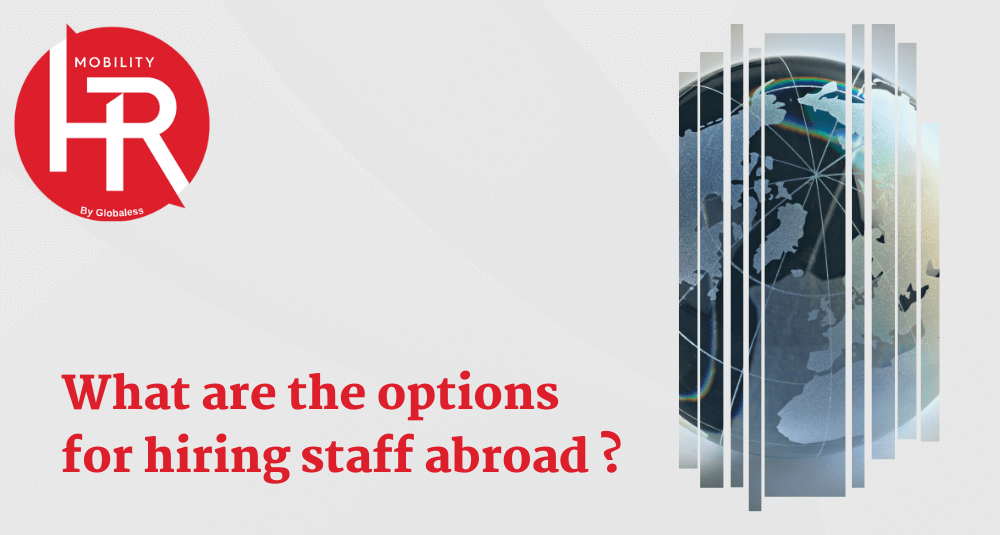The possibilities of hiring new staff abroad in today’s business place are higher than in the past for a number of reasons.
However, if only a handful of employees are to be employed abroad, the effort and costs involved in setting up the company may be too high. They can represent an enormous expense even for medium-sized companies.
Because the process requires a lot of planning and administrative effort, the company has to deal with the target country’s cultural, legal, and technical conditions.
In addition, there is always a specific entrepreneurial risk if the subsidiary has to close again. Once the process has been completed, and if a significant market entry justifies the establishment, internal personnel management for employees abroad can be pretty inexpensive in comparison.
Many companies are urgently looking for skilled staff abroad. However, the search for new employees is becoming more and more difficult. Care and craft professions are most affected.
In the care sector, many companies are now advertising their vacancies abroad. Skilled workers are desperately needed. The neighboring countries are therefore ideal for recruiting employees.
The search for employees abroad is not only interesting for larger companies but also smaller companies.
As an employer, are you planning to hire skilled foreign workers? Depending on which country the applicant comes from, different rules apply. It plays a major role in this, which citizenship your potential new employee has and for which activity to use.
This article will find everything you need to know if you are planning to hire skilled workers abroad.
HIRING FROM ABROAD
If you as an employer want to hire an employee from a so-called third country, he or she needs both a residence permit and a work permit. Only then may such a person be employed.
There are indeed professions that do not require a priority check. This is the case for professions in which there is an acute shortage of skilled workers.
A foreign worker can then easily be hired, as the required visa is easy to justify. Employing foreign applicants is easy in this case.
Hiring From Abroad Due To the Coronavirus
There are many reasons why companies are increasingly using remote teams:
- A shortage of skilled workers
- Expansion into new markets
- Flexibility requirements of young employees
Another was added in 2020: The coronavirus restricts the flexibility and freedom of travel of new workers, which is why hiring employees abroad has become an easier option in many cases.
Instead of recruiting skilled workers from abroad and bringing them to your mentioned country, these employees can work from home in their home country.
This is especially true in light of the coronavirus, which is hastening the move to remote work. People who live within driving distance of a company’s office no longer have to be considered employed.
In today’s world, they can employ the greatest people from anywhere globally, whether or not they have a presence in that country.
An increasing number of companies were moving towards a more dispersed workforce even before the worldwide epidemic hit.
In light of exorbitant rents, employee travel insurance, and general upkeep & maintenance, business executives began to doubt the need for a central office in the first place.
It’s simpler than ever to hire and onboard individuals, no matter where they are, as communications technology improves fast and more people opt out of traditional employment in favor of the gig economy.
It’s estimated that 40 percent of today’s workforce is already working remotely, either at home or worldwide, as part of a “global nomad” lifestyle, which is completely supported by regular employment.
Paying them properly, on schedule, and in complete compliance, on the other hand, is a difficulty. Companies that offer a wide range of payroll, payment, and labor management solutions have overcome this problem.
Visionary payroll businesses are bringing the industry up to date with systems that automate processes and reduce complexity by handling numerous payroll cycles with drastically varied tax codes, labor regulations, and compensation expectations.
When it comes to reaching new consumers, saving money on labor expenses, or even just trying out new products and services, hiring people from other countries has several advantages. Hire employees from overseas for these three reasons.
A fantastic approach to giving your product or service a local feel is hiring local talent in a new area in high demand. Culture-specific people are the finest ambassadors for a product in that culture.
Intuitive in understanding local trends and needs, they know what people want and what they need. A company’s talent pool is severely constrained if it only hires employees who can physically go to the main office from their home or workplace.
With no restrictions on where the finest candidates may be located, there is now absolutely no reason to avoid searching overseas — now that global payroll has been simplified.
People can be hired at competitive wages compared to their home country and yet save on costs that comparably skilled individuals would want in the company’s primary nation.
In addition, benefit expectations vary widely between countries. Doing some studies makes it feasible to provide a good quality of life for an employee while saving money.
Global growth used to be a luxury that only the greatest multinational businesses could afford. A local company was the sole choice for complying with the law.
As a result, the firm had to assume the risk of failure before it was certain that it would succeed in the new market.
As a result, global expansion has become more democratic. Just as many opportunities exist for hiring foreign workers in small, nimble firms, businesses need to hire local regulations.
Contractors Who Work For Themselves
Contractors are considered independent contractors. Contracting companies pay contractors in one go, without subtracting any taxes or paying social security or employer taxes.
As a result, an employer can engage a contractor at a higher hourly rate than a normal employee and yet save money on overall employment expenditures by using a contractor.
That independent contractors have increased substantially as the globe gets more global isn’t a coincidental development. Contracted workers are an excellent alternative to hiring full-time employees to carry out certain tasks for a short period.
One of the disadvantages of hiring contractors is the possibility of classification, which can result in fines from local governments. Therefore, they cannot be considered workers because contractors aren’t employees.
As an employee, he or she would be subject to all of the business’s tax and benefit obligations if the firm had complete control over the contractor’s actions, including how they are carried out, how much they are paid, and how often the activity is performed.
A smart option is to use contractors for little jobs, although categorization is crucial. Thank goodness for organizations who offer such services to eliminate the danger of classifications and manage the hassle of invoicing, payments, etc.
The Recorded Employer
It is possible for a company to stay fully compliant by using an Employer of Record service instead of setting up its own business in a foreign country due to the costs and risks involved.
That is because it wants to take advantage of a market opportunity that cannot wait for a business entity to be set up (which could take several months).
Suppose you’re working under an EoR arrangement. In that case, a local firm becomes the official employer of the employees, assuming full responsibility for them and handling the administrative side of employment such as payrolls, health insurance benefits, and workforce management.
A manager oversees daily operations while the client supervises. In this way, the client firm can avoid establishing a separate organization while maintaining a workforce.
If you want to test a market before you commit, and EoR arrangement is ideal. To determine the viability of the product, the firm might send out a small team.
If this is the case, the firm can create a separate organization and assume full responsibility. If not, it can shut down the EoR without any penalties if it chooses to do so.
One of the best options for short-term involvement is an EOR. As soon as the task is done, the business may pack up and go. The firm may not wish to build a branch in the nation since it does not want to stay there for the foreseeable future.
Investing In A Company
There’s no substitute for setting up an entity and taking on full legal responsibility for firms that want to stay in a nation for a long time.
With this option, a firm may sign contracts and do agreements, something they couldn’t do with EOR. It’s the most solid method to establish a presence.
Opening a company may be a costly and time-consuming process. It needs a thorough grasp of the local tax structure and labor regulations, as well as the registration of the firm with all of the appropriate tax and social security agencies.
However, many of the more complex activities, such as payroll and labor management, may be outsourced to global payroll firms. Having a legal entity places the entire burden on the corporation.
Each employee’s paycheck is computed correctly, and the appropriate taxes are paid. It’s not uncommon for a payroll provider to partner up with a local accounting company or labor law firm, so the process is aided by local expertise.
Employment of Employees as Freelancers
The most frequently used option to hire employees in other countries and markets is to employ them directly as freelancers. As a freelancer, you can work in many countries and travel to them simultaneously or work at home.
Companies like to use the freelancer variant, especially when it comes to project-related employment of employees abroad. Before the start of the project, all conditions are set out in a flexible service contract and remuneration, services, and time planning.
Difficulties, which occur more frequently with the long-term employment of freelancers, include:
- There is no employment contract, as only a service contract is signed
- Difficulty in recruiting, especially for highly qualified employees
- Lack of employee safety, as there is no protection against dismissal under labor law
The obligation of employees to independently take care of social security contributions and income tax
The high flexibility, also on the company’s part, can nevertheless speak in favor of this form of remote hiring. Specialists are called in as required and deployed with pinpoint accuracy.
However, legal difficulties can also arise. In some countries, the long-term employment of freelancers is illegal (e.g., in India and China) since a permanent establishment is being set up, which has to be reported to the local tax authorities.
For longer employment relationships, there are therefore better options than employing employees through a freelancer contract.
Why Freelance Remote Hiring Work Is Worthwhile
Freelance work during a Work and Travel stay is worth it. If the job you are searching for does not go so well, you have the option of accepting jobs from employers abroad at any time.
You’re not starting from scratch, and you may be able to make more money, especially if it’s a skilled job. That being said, you don’t have to derive all of your income from freelance work.
Also, a good mix of work & travel jobs on-site and freelance work for employers at home or in other countries (Austria, Switzerland, USA, etc.) is possible and often attractive.
At the same time, you can also earn money regardless of location, for example, while traveling and, for example, flush a little money into the travel budget during a road trip.
Often it is enough if you work around two to three hours a day. If you can’t find a job locally, freelance work always offers you an alternative to earn a living.
Even if you do not want to apply for a working holiday visa for various reasons, you can still earn money as a freelancer on the go because you are registered in your employed company abroad and also pay taxes there. But how does it work as a freelancer while on the go, and what are the options?
The Main Advantages Of Working With An Employer Of Record
- Signing a full employment contract
- Guaranteed protection of the employee thanks to the notice period by local labor law
- High employee loyalty to the company, as directly employed
- The Employer of Record reports social security contributions and income tax payments as an employer
- Complete protection of the intellectual property of German companies
- Employee has a local contact point in his country for all administrative questions
- Transparent insight into all payments made to local authorities
Talent acquisition from overseas is already common in many forms, and it will only become more common in the future. Each firm indeed needs to decide for itself what type of employment is best.
Freelance employment is often seen as low-risk and straightforward, but it may also be fraught with legal ambiguity, and the quality of work on long-term projects might suffer from a lack of dedication to the firm.
So to say, establishing an independent company involves full control over all procedures and full accountability, and a lot of work. In globalization, an Employer of good records may be a good and convenient happy medium.
Because there are no lead periods or fees for setting up your own representative office, this option allows you to legally hire potential workers in the relevant nation while still providing the customer with all the benefits of a permanent job.
CONCLUSION
When it comes to long-term travel, working as a freelancer may require some organizational effort, but it is well worth it in most cases.
You can make a living without having to rely on the host country’s job market. As a result of not being tied to fix working hours or a specific location, you are even more relieved.
When it comes to work-and-travel employment, those with expertise and specific knowledge may sometimes make more money. Because of the small business regulation, you can get around with much less bureaucratic effort if you don’t make more than 17,500 euros in a year of implementation.
More and more companies are outsourcing tasks that do not require a physical presence on-site, resulting in more possibilities of hiring staff abroad who are not physically present.


